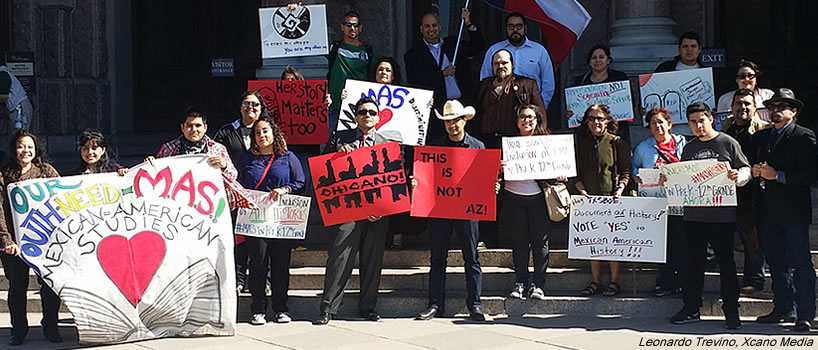
Coaltion of Chicano Activists Joined on Steps of Texas State Capitol to Ensure Mexican American History is Taught in Schools
are, you’re not going to be able to succeed.” Tony Diaz, aka "El Librotraficante" who made use of his time outside of the classroom smuggling books back in to Arizona after the implementation of HB 2811 which banned Mexican American Studies in Arizona added, “This is huge! I’m glad this is a Texas thing, we have Republicans and Democrats voting on this together.”
Board member Ruben Cortez, who authored proposal Proclamation 2016, was met with suspicion by his Republican peers but stood firmly by his position on the issue declaring, “I’m feeling pretty proud at this moment.” His proposal’s firmest opponent was Board member David Bradley, a republican from Beaumont, who claimed Cortez’s proposal was “reverse racism,” and threatened to “pull a Cesar Chavez" in the middle of public testimony to "boycott" the proceedings.”
The session lasted 3 days ending on Friday April 11th with a vote of 11 to 3 … in favor of a change! The original plan was seeking a deeper representation beyond the three paragraphs on Cesar Chavez in Texas Textbooks but, the result, inclusion of multiple under represented ethnicities throughout the U.S. including: African Americans, Asian Americans, Native Americans, and of course Mexican Americans. Another slant on the decision was that curriculum wouldn’t change just yet however, the opportunity to make an Elective in Mexican American Studies available would now be an option for school districts to incorporate into their school’s model, if they wanted it. A far reach from what the original goal was but many of the activists involved agreed that change begins somewhere. But before Raza could roll out the Mariachis and Conjunto bands, the deceptive powers that lurk in the shadows went to work on July 16th.
“It took the Texas School Board of Education (TSBOE) only 3 months to turn Proclamation 2016 into 2017 and take Texas back to 1917,” said Tony Diaz of the TSBOE’s decision to prolong the initial implementation of the elective and textbook revisions. This statement, found on his website Librotraficante.com, was a direct response to the 12-1 vote which will “alter the language of Proclamation 2016 to close the door to alternative courses such as Women Studies, and it also changed the year of the proclamation to further put off serving its predominantly Mexican American and African American student body.” This was the general consensus of those who were in the trenches of the issue. The TSBOE cited financial difficulties as the main source of going back on the decision made in April.
Anyone who has studied Chicano History can point to a time in our past where things were promised and, under the guise of policies and politics, those things were yanked from under our feet like a magician pulling the table cloth out from under the dishes; it happened faster than we expected. Diaz and supporters regularly makes references to the controversial actions of the Arizonian governing body. Though separated by New Mexico, it’s difficult to ignore the similarities Texas and Arizona have and, the actions they’re taking to keep the Chicano narrative from being articulated.
Most recently, the discriminatory actions of Gov. Jan Brewer (R) and, Arizona’s Republican Party, to ban Mexican American Studies in the TUSD (Tucson Unified School District) in 2010 are, while upsetting, not surprising since Arizona’s political identity is as a Red state. Three years later, that decision was upheld by Federal Judge Wallace Tashima. After intense protest by students within the school’s district and support from the extended Chicano community, Gov. Brewer was able to muster enough support on the ban after, then Superintendent and now, Arizona Attorney General Tom Horne (R) began the initial remonstration shutting the program down at its core; in Tucson high schools. Allegations by Brewer and Horne ranged from the promotion of hate towards non-Hispanic Whites, to students being taught how to over throw the government. The basis for these inequitable decisions stemmed from one visit by the Superintendent of Public Instruction John Huppenthal. A visit in which he never saw the actual curriculum being implemented. But it did not end there …
Following this ban, the books that were being used to “over throw the government” were also outlawed in The Grand Canyon State. Literature authored by Sandra Cisneros, Carmen Tafolla, and Paulo Freire as well as many others, were said to have content which aligns with the allegations listed above. Though Huppenthal never cracked a single one of these books open or, visited a classroom to witness first-hand the pedagogy being ministered, the Karl Marx references were enough to deem it immoral and pulled directly off the shelves of classrooms while students watched in tears.

